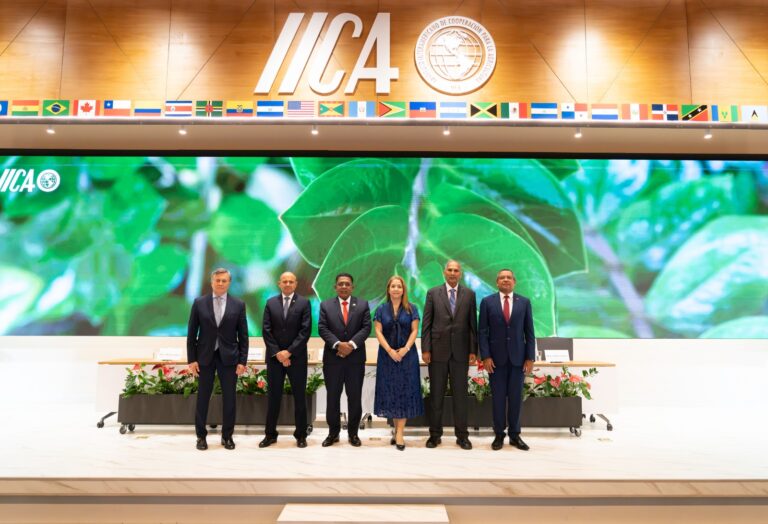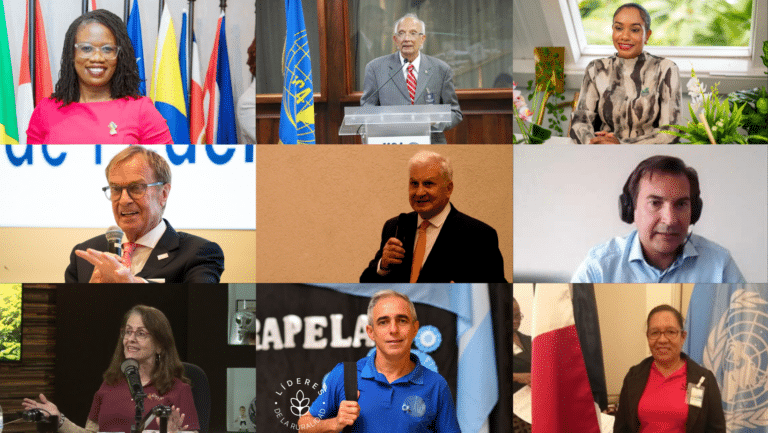The Costa Rican Coffee Institute (ICAFE) developed the measures, with the support of the Inter-American Institute for Cooperation on Agriculture (IICA).
There was a presentation of 26 infographics, outlining the sanitary measures to be implemented by the Costa Rican coffee sector.

San Jose, 2 September 2020 – The Costa Rican coffee sector gave a presentation on August 28, outlining the sanitary measures and actions it is putting in place to responsibly tackle the COVID-19 pandemic during the 2020-2021 harvest, which is projected at two million quintals.
The sector presented the “Protocol for the Implementation of Anti-COVID-19 Sanitary Guidelines and Procedures in the Coffee Sector”, in conjunction with a “Toolbox” with 26 infographics, outlining the guidelines to be followed. These visual elements will be displayed in farms, coffee mills and coffee companies to properly inform individuals who are involved in this important economic activity.
The actions aim to transform coffee farms and mills into safe workspaces and their successful implementation will require that farmers, reapers, extension officers and other actors in the coffee chain be thoroughly prepared.
The material was developed by the Costa Rican Coffee Institute (ICAFE), in conjunction with the Inter-American Institute for Cooperation on Agriculture (IICA) and with the backing of the Ministries of Agriculture and Livestock and of Health, in compliance with Guideline 082-MP-S.
Minister of Agriculture and Livestock, Renato Alvarado Rivera, remarked that, “The Ministry applauds the work that ICAFE has done to develop these protocols in collaboration with IICA, as they will ensure that producers and workers in the sector can continue their activities in a safe way”.
“This initiative is part of the efforts by the Costa Rican coffee sector to adapt to the new sanitary conditions created by the pandemic”, said Xinia Cháves Quirós, Executive Director of the Costa Rican Coffee Institute. “I would also like to thank the technical staff of ICAFE and the Ministry of Labor and Social Security, as well as the private sector organizations that shared their knowledge and experience to assist in the development of this protocol. So too must I pay special recognition to the IICA specialists who, with the greatest dedication and commitment, provided technical support to the process of developing the protocol”.
Miguel Arvelo, IICA Representative in Costa Rica, remarked that, “IICA is committed to the agriculture sector and recognizes that the leadership of ICAFE and MAG is vital to ensuring continued activity in the coffee sector under the current circumstances, while prioritizing the safety of rural workers. Coffee is a strategic sector for the economy and rural development and an important part of Costa Rica’s history and culture. We are confident that this information will be widely disseminated throughout the coffee regions of the Americas”.
Efforts to address the COVID-19 pandemic in the sector complement actions implemented by the Cost Rican Government to protect public health and reduce the economic impact of the virus in the country.
The 26 infographics of the toolbox can be downloaded from the following link: http://www.icafe.cr/icafe/caja_herramientas/
About ICAFE
ICAFE is the institution that regulates, fosters and protects coffee activity, in a bid to ensure its sustainability and the socioeconomic welfare of the sector, while producing coffee of the highest quality.
More information:
ICAFE
Víctor Vargas, Costa Rican Coffee Institute
IICA
Sacha Trelles, Technical Coordinator, IICA Costa Rica










